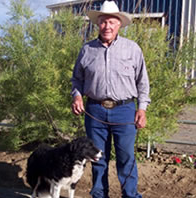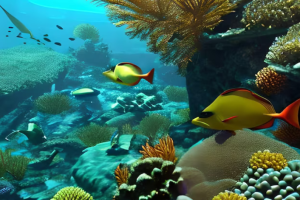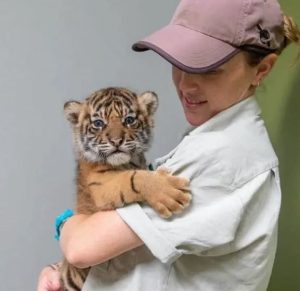It’s easy to spot Butch Wilson and his border collie in their orange vests, a common sight at Crespi Pond on the Pacific Grove Golf Links. They’ve been employed to corral coots, geese and other offending birds that litter the greens with a spate of droppings daily. Wilson whistles from his golf cart and one of his five obedient workers lopes low around the course, herding the birds back onto the pond.
Since golfers are impervious to weather, the duo works rain or shine, Friday through Sunday and holidays. Occasionally Mimi, Butch’s wife, spells him.The barrel-chested 68-year-old man is proud of his cutting-edge migratory bird-control business, called PGDogs.
He also volunteers to keep San Carlos Cemetery clean for visitors who often thank him. Eyes brimming with tears he says, “My father was a chaplain at Robert Louis Stevenson School and it’s almost like an extension of that, to honor the people who come to pay their respects to loved ones.”
With a heart as wide open as Wyoming, his birthplace, he says, “I’ve always had a dog. Dad said, ’Every boy should have a dog and every dog should be named Shep.’ “Big grin, more misty eyes. The image of the man widens when he divulges that he wrestled steer in the rodeo and was a running back/defensive back at the University of Wyoming.
“I was brought up on an Indian reservation. My grandmother was half Mohawk. That’s why I’m always beating my tom-tom.” After military school he became an Air Force pilot, after that a cattle rancher, and then the owner of a bowling lanes in Cheyenne. For 14 years he worked for Pebble Beach Co., “I’m known as the singing gate person.” And then his knees and hips gave out.
“When my body started falling apart, I told people I’m going to the dogs.” Voila! His trendy new career emerged in October 2000 and has been written about in a national golf magazine.
Q: Did you invent your job?
A: In 1992 we got our first Belgian sheep dog. Then we got a border collie, Shep. We have five now. In ’94 I started doing herding. In October 2000, friends told me about using dogs on golf courses for migratory bird control. I thought that was something I would like to do. And since there are 18 golf courses within 15 miles of my house, it was an opportunity for a niche business. I’ve worked at Pasadera Country Club, Pebble Beach Golf Links and Cypress Point.
Q: Ever get bored out there?
A: Never. I love talking to golfers and seeing how happy they are to see the dogs keeping geese away. If someone pays $350 a round to play, they don’t want to step in goose manure… I watch the whales, deer, geese and all kings of ducks. According to birders’ magazines, Crespi Pond is one of the most popular birder places in the country.
Q: It seems I’m always _______.
A: At a golf course. This business is so busy right now. A biologist with U.S. Fish and Wildlife said California has two problem areas with resident Canada geese: Carmel Valley and the San Francisco Bay area. Now they’re getting a dog at Quail Lodge golf course. It’s developing all over the United States. People feeding wildlife is a real problem because they stop migrating. One goose per day eats over one pound of grass, destroys five square feet of turf and deposits over one pound of feces.
Q: How do you advocate animal welfare, or not?
A: All animals are just like all people and need to be treated humanely… We take very good care of our dogs. We have large vet and feed bills and this little business helps. We’ve won at sheep dog and cow dog trials.
Q: How can you get a dog not to eat a bird?
A: Border collies in the U.K. have been drovers for hundreds of years. They were taught not to bite them. They’re so smart they know what you expect. We don’t throw sticks for them to retrieve.
Q: What misinformation about migratory birds would you like to correct?
A: We herd them, not hurt them. The dogs never bite them and they come back later. The migratory Canada goose population has really dwindled, but the resident population has grown. They love the short succulent grass of cemeteries, parks and golf courses. We’re trying to get them to do migration so people shouldn’t feed them.
Q: What have you observed about golfers?
A: They really enjoy playing golf. It seems like a real love passion. They’ll throw clubs, have tantrums and blame it on their equipment. Or they talk to the golf ball and tell it to sit or get up.
Q: Can you estimate the number of balls at the bottom of Crespi pond?
A: I would say nearly one person out of every foursome hits one into the water. Once I watched a lady hit 13 into the water.
Q: While you’re keeping the course clean do you get showered with seagull droppings?
A: Mom always said, “I’m glad cows don’t fly.” A magpie dropped on my wife once. Seagulls can’t be driven away. They just come right back to their snack shack where people leave food out.
Q: You say your forte is horses!
A: Yes. They still sell a feed I developed call Wilson Horse Pellets. My father, C.E. “Coach” Wilson, came to RLS to coach and then was their chaplain. I worked at the Pebble Beach Equestrian Center where I started driving horses and carriages for weddings, hayrides and competitions. I did some training, too. I worked on the biggest horse ranch in Oklahoma caring for racehorses, etc.
Q: Is rodeo a passion?
A: I started in high school. In college, I went on an athletic scholarship, I was president of the rodeo club and I won a belt buckle. I quit after college because my passion was flying and I didn’t want to get hurt.
Q: Your most memorable flight as a pilot?
A: Fire protection. We’d fly 150 knots 150 feet above ground, and drop 20,000 gallons of fire retardant in 20 seconds. Remember the Marble Cone fire in Big Sur? We dropped fire retardant from C-130s, Hercules, the same ones used as gun ships in Afghanistan now.
Q: What animal would you be and why?
A: A border collie. They’re the smartest animal. They have the reasoning ability of a 12-year-old child. And if they get hurt they can run on three legs. They’re amazing.



